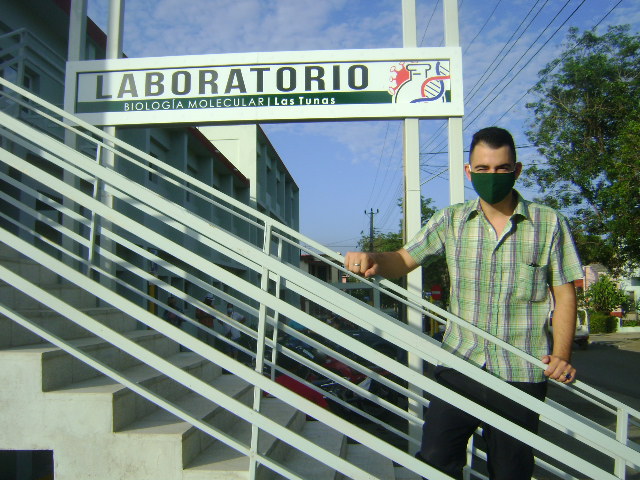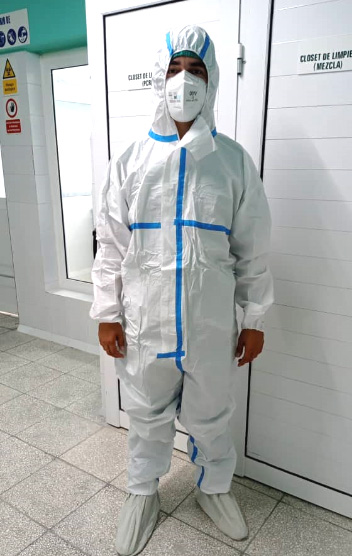
At barely 25 years of age, a young man confirms in a Molecular Biology Laboratory the potential of his generation in the tenacious fight against COVID-19.
When I finished talking with Emilio Ernesto Fontecilla González, a sudden premonition settled in my mind: "This boy will go far". The conjecture did not seem risky to me. Instinctively, we tend to sense when someone's neurons are above average. And this boy, with only a couple of years as a graduate in Microbiology at the University of Havana, dissects on the profession as if he were an expert. Thus, he explains, clarifies, specifies, uses terminology... In the Molecular Biology Laboratory of Las Tunas, he demonstrates his talent.
How did you get into this highly specialized profession?
"I was influenced by my mother, a microbiologist by profession. Since I was a child, I used to accompany her to the laboratory and watch her work with her instruments. That's how I became familiar with the profile. It is understandable then that I asked for Microbiology as my first choice when I finished my pre-university studies. Finally, it came to me, and after completing my Active Military Service in the Border Brigade, in Guantanamo, I enrolled in the Biology Faculty of the University of Havana.
"They were five intense and profitable courses, with highly qualified professors, some of them coming from the Pedro Kourí Institute of Tropical Medicine (IPK, by its acronym in Spanish), a scientific center of world reference. In its premises, I received lectures on various topics, such as fungi and herpes viruses. Also, an elective subject entitled Virus and Cancer.
"That's how I became interested in the study of viruses, one of the branches of Microbiology. So much so that from the third year of my studies in the major I did my internship in the Department of Animal Virology of the National Center of Agricultural Health (CENSA, by its acronym in Spanish), in Mayabeque. There, I broadened my knowledge on Molecular Biology".
What direction did you take after graduating in 2019?
 "I was placed as a trainee professor at the University of Medical Sciences in Las Tunas. I taught classes to students of Stomatology, Medicine, Clinical Bioanalysis... Many were surprised that someone so young was teaching at that level. But others said that, because of my seriousness, I seemed older.
"I was placed as a trainee professor at the University of Medical Sciences in Las Tunas. I taught classes to students of Stomatology, Medicine, Clinical Bioanalysis... Many were surprised that someone so young was teaching at that level. But others said that, because of my seriousness, I seemed older.
"In April 2020, the rector of the institution called a meeting of microbiologists and biochemists. The COVID-19 pandemic was already starting to make its appearance in Cuba. She asked us if we thought it was feasible to create a Molecular Biology laboratory in the province to help process samples in addition to those already existing in the country at that time. We said yes and offered to collaborate.
"Sometime later, at the request of the Provincial Center of Hygiene, Epidemiology, and Microbiology, I traveled to Holguin, to prepare myself in the laboratory of that city, which had already been active for some months. It was two weeks in which I learned a lot with their specialists, all of them very well prepared. There we were trained in sample mounting and amplification readings, a technique based on Molecular Genetics, which allows us to identify the type of virus with the joint use of PCR equipment".
And on your return, you went straight to Las Tunas laboratory?
"Yes, the inauguration of our laboratory was on April 10. I remember that I was asked to speak on behalf of the collective, as I was its youngest worker. An IPK expert stayed with us for a week as a consultant. When we received certification, we started processing samples. Initially, positive diagnoses were sent to Ciego de Avila and the IPK for confirmation. We have gained experience and now it's on our own.
"This laboratory has state-of-the-art digital technology and the capacity to process around 500 samples a day. Since its opening, we have analyzed more than 40 thousand. Unfortunately, in the last stage, the positives have increased by far. Among the causes is sanitary indiscipline on the part of the population: there is no perception of risk and even less of danger! As human beings that we are, this senselessness does not cease to worry us."
Explain to me the process of analyzing the samples.
"First they are settled in a database, with information on the symptoms of their owners, if they are suspects or contacts if their positive diagnoses come from quick strips... Those that are complete are assembled in two blocks -of 16 capacities each- so that the RNA (Ribonucleic Acid) extractor and purifier and the SLAN, equipment that processes the PCR (Polymerase Chain Reaction), together with an added mixture, perform their work.
"The real-time PCR detection kits used in Cuban laboratories are imported and very expensive in the international market. That is why we must have a diagnostic kit of antigens made in our country. With that, the country would replace imports. Scientists from the Immunoassay Center are working intensively to obtain it.
"By the way, the coronavirus, as a group, is not a new one. SARS-CoV-2, one of its species, is. Within the same species, there can be several strains and variants, which are identified with highly specialized techniques. It is called coronavirus because of a small crown that characterizes it when observed through electron microscopy."
Are you never afraid of the possibility of contagion?
"Fear is consubstantial to any person, but it can be controlled. If the microbiologist comes to the lab with uncertainty or hesitation, he may not feel comfortable in his work and may even make mistakes. A clear mind, full confidence in his or her ability, and adherence to the rules of protection are required.
"By the nature of its profile, Microbiology is very risky, but there are means for us to keep ourselves safe. Certified laboratories comply with standards that protect their personnel and prevent samples from becoming contaminated. We have filters, diving masks, sanitary gowns, gloves, caps... We rub shoulders with danger, but if we comply with the protocols, there are no problems".
What is a working day like for you in the lab?
"Very intense! We work 24 consecutive hours, with only breaks for bathing and eating. During that time, we have to stay inside the lab, processing the samples. Then we rest for 72 hours. I use this time to rest and relax because our work generates a lot of stress. Despite that, I love my specialty."
"With the protective suit we look like cosmonauts," Emilio jokes.
"Regarding my professional updating, I always do it on the Internet whenever I can. There are excellent sites that gather the latest news in the profession and you need to be up to date. As for my preferences, I don't go out much, especially now that there is a pandemic. I like social networks, although they don't obsess me to the point of occupying all my free time.
"If it's about current events, I go to Cubadebate a lot. It is among the best of our journalism. I also watch series and movies. Or I read a good book... When the epidemiological panorama improves, I will continue studying. Maybe I'll start a master's degree and then a doctorate. I am young and I have time. But, for now, that's not possible."
What role do young people play in your laboratory?
"A very important role. Our team is mostly young and also very competent. But it is not only that: several students from Las Tunas are studying this major at the university and have expressed their full willingness to join our work, even during their vacation periods. With them, Microbiology is assured of a macro-future".